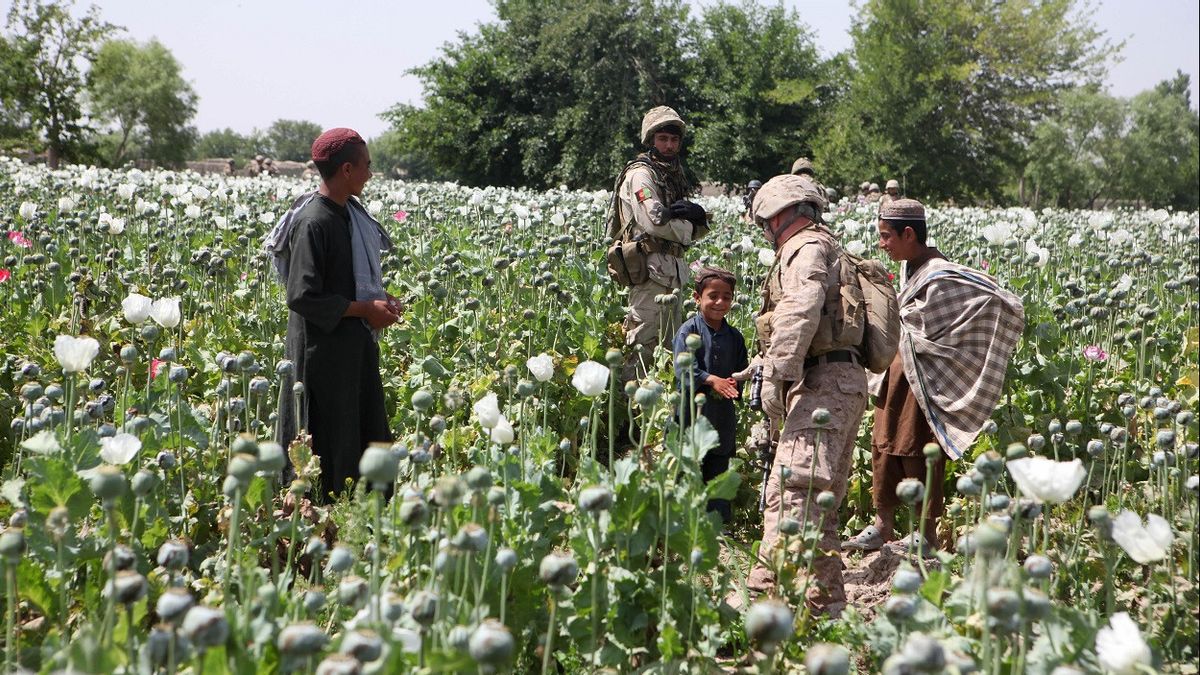JAKARTA - Opium prices in Afghanistan have tripled since the Taliban seized power and announced a possible ban on plants whose sap can be used to make heroin, morphine and crystal methamphetamine.
The Taliban militant group took control of Kabul, the Afghan capital in mid-August, after a blitzkrieg campaign that lasted less than two weeks, swept the country.
Among the signals sent to the international community in a bid to maintain important financial support, as well as international trust, the Taliban said the country would no longer produce narcotics.
This condition has actually caused the price of Afghan opium to soar in the market, far from the normal price.
At one market in southern Afghanistan, Amanullah (not his real name) and his partner Mohammad Masoom knew they could get a good price on their latest batch.
The opium they sell is pure. They checked by extracting small pellets from one of the 4 kg brown mud bags, then placing them in a bowl over a fire. The poppy resin has been boiled, melted and remains homogeneous, proof has not been cut with chemical additives.
They should be able to earn around 17,500 Pakistani rupees per kilogram, or around 90 euros, Mohamad explained.

A few kilometers away, still in Kandahar Province, Zekria (not his real name) confirmed the recent price spike. The farmer is now selling his opium, which is better quality than Mohammad's, for more than 25,000 Pakistani rupees per kilogram or about 126 euros, compared to 7,500 Pakistani rupees before August or before the Taliban takeover.
The opium is then processed either domestically or in neighboring Pakistan and Iran, and then shipped to the main market, the Blue Continent, Europe.
Traditionally, a number of factors influence the price of opium, ranging from weather, security, political turmoil to border closures.
But none of that had the impact of an Aug. 17 statement by Taliban spokesman Zabihullah Mujahid that saw rumors of a ban on opium cultivation spreading like wildfire in Kandahar Province, a historic Taliban stronghold, a major opium producer and trade hub.
"Buyers are anticipating a shortage of opium, and that's driving up prices," Zekria said, citing Euro News Sept. 30.
The 40-year-old man, who has spent the last 20 years growing poppies like his father and grandfather before him, does not believe the Taliban can eradicate all opium in Afghanistan.
In 2000, the first Taliban regime had banned the cultivation of opium as 'haram' (against Islamic law) and reduced production, before being overthrown by the West, which also sought to eradicate it.

But year after year, Afghanistan's opium production remains very high. By 2020, the country will become the world's top poppy grower, producing 6,300 tonnes on 224,000 hectares, according to the United Nations.
The production generates revenues of about 2 billion US dollars or about 1.7 billion euros in one of the world's poorest countries.
Other jobsFarmers in the South, however, are in no hurry to seek confirmation of the impending ban.
"We know it's not true, even though it's forbidden by Islam. But we have to do it, otherwise we can't make a living. Here we have no water, no seeds, we can't plant much more," Mohammad said.
Zekria, who has a family of 25 to feed agrees, "Without opium, I can't even cover my expenses."
"We have no other work, no other solution if the international community does not help us," he added.
However, international aid has so far failed, despite the huge amount of 8.6 billion US dollars or 7.4 billion euros invested by the United States over the last 20 years.
The Taliban, meanwhile, finance their insurgency against the Western coalition largely on the production and trade of opium. The United Nations estimates that about half of their income in 2016 came from it.
Now they are back in power, but the economy is crumbling and famine is threatening a third of the population, according to the United Nations.
In his office in Kandahar, one of the provincial officials, Mullah Noor Mohammad Saeed, reiterated that producing opium is prohibited by Islam and bad for humans.
But he was careful not to confirm the impending ban, and also gave the pound to the international community.
"If they are ready to help farmers stop opium, then we will ban it," he said.
The English, Chinese, Japanese, Arabic, and French versions are automatically generated by the AI. So there may still be inaccuracies in translating, please always see Indonesian as our main language. (system supported by DigitalSiber.id)













